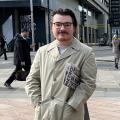
A Hollywood blockbuster about Robert Oppenheimer and the development of the atomic bomb is set to hit the cinema screens this summer and one veteran is determined to see it.
Ex-Royal Navy mechanical engineer David Taunt was there on Christmas Island when the Americans were testing the weapon in the 1960s.
The 80-year-old, of Blunsdon, witnessed horrific, beautiful, and outright shocking sights in his eventful navy career.
David joined the navy straight from school in 1958 at just 15 and became a trainee at HMS Ganges near Ipswich where he learnt basic military training.
“I learnt to tie knots and march over a 12 month period,” he said.

After six months of technical training at HMS Raleigh and some specialist internal combustion engine work at Chatham Dockyard, David boarded HMS Puma and set sail for South America, South Africa and the Indian Ocean.
“It was during this time that we were involved in the evacuation of the volcano in Tristan da Cunha over in Saint Helena,” he said.
After two months of localised earth tremors, the volcano erupted on October 10, 1961.

David and his rewmates helped evacuate the nearly 200 inhabitants to safety and a new life in Cape Town, South Africa.
The images of that time stay with him still. “It was horrendous; we saw smoke coming out of the top of the mountain,” he said.
“We didn’t get any warning really. We took all the locals and transported them to the safety of Cape Town.
“At the age of 17 it was of course exciting too, but you’ve got to get on and do your job.”

A volcanic eruption would be enough of a story for most people to tell their grandchildren, but what David was about to witness made a natural disaster such as a volcanic eruption seem tame.
“We arrived on Christmas Island at the start of the 1960s and it was absolutely gorgeous with coconut trees growing naturally,” he said.
“We were told it was a tropical paradise and it did not disappoint.”

The spot had been used by Britain to detonate nuclear bombs in the 1950s and while David was there, the Americans used it for the same purpose.
“We were informed that the Americans were going to come over and perform nuclear tests,” he said.
As part of Operation Dominic, the US detonated 24 nuclear bombs - David witnessed them all.
“Prior to the detonations we were told to gather on the playing field we had made and sit on the ground,” he said.
“We sat with our backs to the detonation and covered our faces with only a pair of blackout goggles on in the way of protection.”

The experience of being present at nuclear explosions with such regularity is a memory that haunts David forever.
“We waited for the countdown on the Tannoy and then you would feel the heat which was maximum temperature like stepping into an oven,” he said.
“Then there was a small delay before the blast hit you and the impact was enough to knock you flying off your feet if you were standing.”
The heat and the force were not the most worrying aspects of the horrifying experience, but rather what David could see during the tests.

“You could see the bones inside your hands through the goggles they gave us due to the x-ray effect,” he said.
David left the navy in 1970 after a 12 years, including one spent on Christmas Island.
He is aware of the new Oppenheimer biopic, starring Cillian Murphy and due to be released in July and says he's definitely going to watch it. He sees the atomic testing as unique in human history.
“It just was absolutely petrifying to think that the human race could develop such weapons of mass destruction.”

Looking back on the horrors he witnessed along with the beautiful sights and all round excitement, David remains awestruck with the experience.
“I’d do it all again! It was a fabulous life as I saw the world and the cameraderie was brilliant. It’s all I ever wanted to do. I wanted to see the world and I lived my dream.”
David was honoured by King Charles III and prime minister Rishi Sunak in November with the promise of a medal for him and his fellow nuclear testing veterans.
This finally marks the recognition that the testing veterans and their supporters spent years campaigning for.



Comments: Our rules
We want our comments to be a lively and valuable part of our community - a place where readers can debate and engage with the most important local issues. The ability to comment on our stories is a privilege, not a right, however, and that privilege may be withdrawn if it is abused or misused.
Please report any comments that break our rules.
Read the rules here